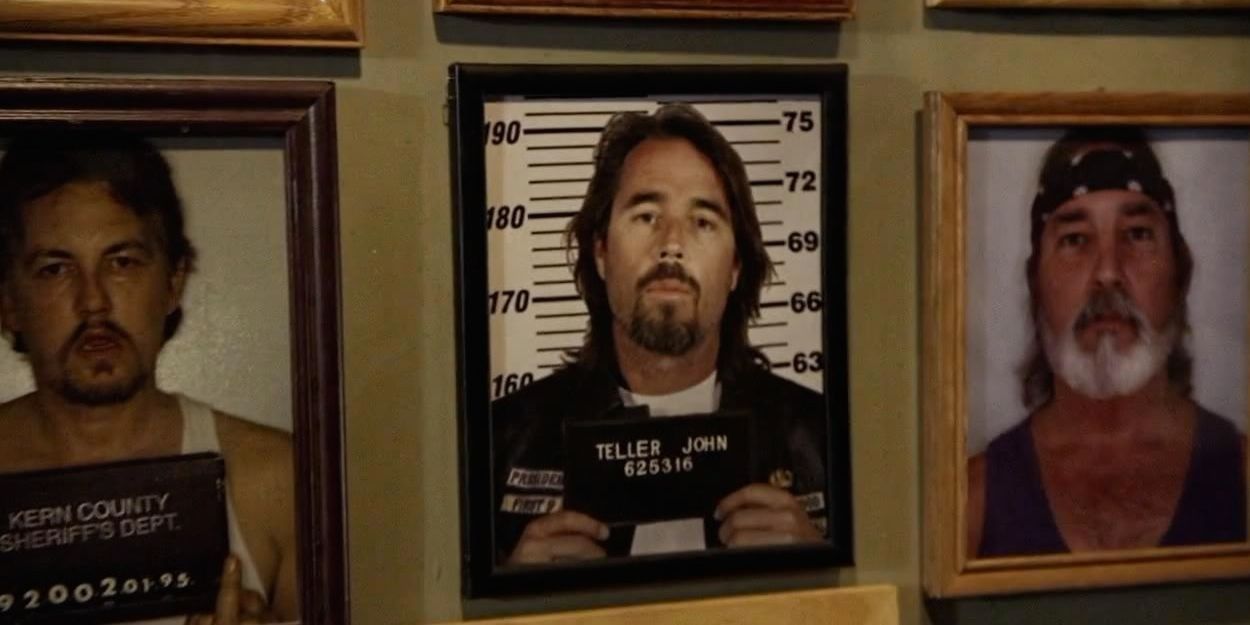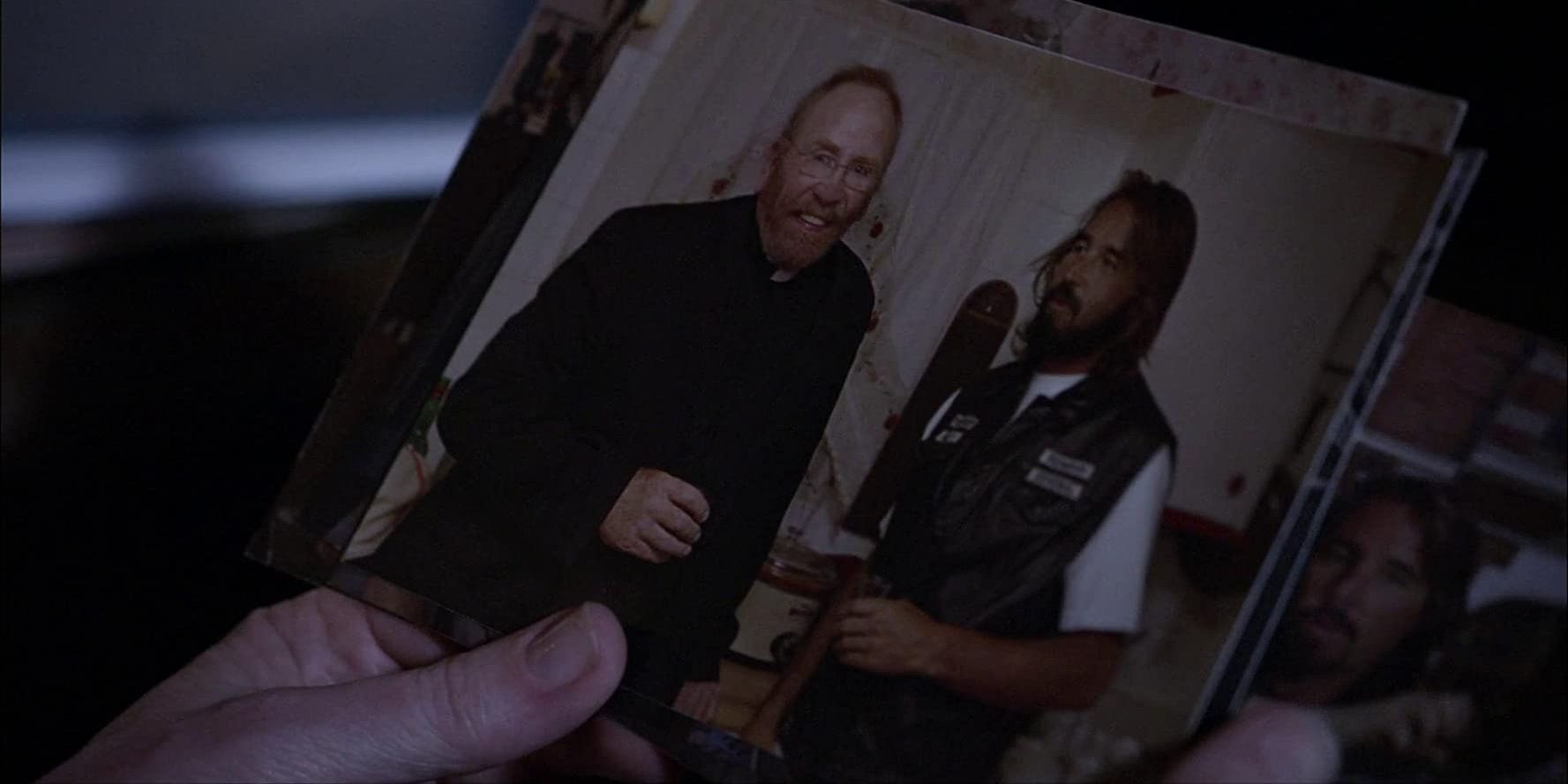Was the fateful motorcycle accident that claimed the life of John Teller, the visionary founder of the Sons of Anarchy Motorcycle Club (SAMCRO), truly an accident? Or could it have been a meticulously orchestrated act of self-destruction disguised as misfortune? The circumstances surrounding John Teller's death are shrouded in ambiguity, leading many to speculate on the possibility of suicide, despite evidence pointing towards foul play.
The narrative of FX's "Sons of Anarchy" paints a complex picture of John Teller, a man wrestling with disillusionment and a growing sense of unease regarding the path his beloved club was treading. Theories abound, suggesting that Jax's father possessed a premonition of his impending demise, perhaps even a hand in its orchestration. As the series unfolds, viewers are privy to the intricate web of deceit, betrayal, and power struggles that ultimately led to John's untimely death on November 13, 1993, an event that would irrevocably alter the course of SAMCRO and the lives of those within its orbit.
| Attribute | Details |
|---|---|
| Full Name | John Thomas Teller |
| Nickname | JT |
| Date of Birth | N/A (Presumably in the late 1940s/early 1950s, based on his Vietnam War service) |
| Date of Death | November 13, 1993 |
| Cause of Death | Motorcycle Accident (Potentially Sabotaged) |
| Occupation | Founding Member and Former President of SAMCRO |
| Spouse(s) | Gemma Teller Morrow (deceased) |
| Children | Jax Teller, Thomas Teller (deceased) |
| Loyalty | Sons of Anarchy Motorcycle Club, Redwood Original (SAMCRO) |
| Portrayed By | Various actors in flashbacks and archival footage |
| Key Relationships | Jax Teller (son), Gemma Teller Morrow (wife), Clay Morrow (best friend/antagonist), Piney Winston (club co-founder) |
| Vietnam War Service | Yes, Veteran |
| Ideology | Originally idealistic about SAMCRO's potential for good, later disillusioned by its descent into criminality. Advocated for a legitimate future for the club. |
| Conflict with Clay Morrow | Emerged due to differing visions for SAMCRO's future and Clay's increasing involvement in illegal activities, primarily gun running. Also, John's suspicion of Gemma and Clay's affair and plans. |
| Letters to Maureen Ashby | Revealed John's growing distrust of SAMCRO and his fears regarding Clay and Gemma's intentions. These letters played a crucial role in Jax's understanding of his father's death and Clay's betrayal. |
| Link to Authentic Website | Sons of Anarchy Wiki - John Teller |
The seeds of John Teller's demise were sown when he voiced his growing discontent with SAMCRO's trajectory, particularly its deep dive into the treacherous world of illegal firearms. As John's moral compass clashed with the club's increasingly criminal activities, Clay Morrow, driven by ambition and a desire to maintain control, hatched a sinister plot to eliminate his former friend and comrade. This conspiracy was further fueled by John's suspicions regarding Clay's affair with his wife, Gemma, and his fears that they were plotting against him.
- Ashley Isaacs Ed Concerns Amp Reugeniacooneys Shocking Views
- Hewlett Hewitt Foundations A Guide To Philanthropy Impact
Adding another layer of tragedy to this already grim scenario was the concurrent illness and eventual death of John and Gemma's son, Thomas Teller. The emotional turmoil surrounding Thomas's failing health undoubtedly weighed heavily on John, further contributing to his despair and sense of hopelessness. Born in 1978, Jax Teller, the other son of John and Gemma, grew up immersed in the world of SAMCRO, witnessing firsthand the club's evolution from its idealistic origins to its darker, more ruthless present. Jax's upbringing, shaped by his father's legacy and the circumstances surrounding his death, would ultimately define his own journey within the Sons of Anarchy.
John Teller's vision for SAMCRO, initially rooted in camaraderie, brotherhood, and a desire to provide a haven for Vietnam veterans like himself, gradually eroded as the club became entangled in a web of criminal enterprises. Despite having founded the Sons of Anarchy, Jax's father ultimately lost faith in the organization he had painstakingly built. In the end, John Teller didn't trust the club, but that wasn't always the case. The allure of power, wealth, and control proved too tempting for some members, leading to a deviation from John's original ideals and setting the stage for the tragic events that would follow.
The discovery of letters penned by John Teller to his Irish lover, Maureen Ashby, became a pivotal moment in the Sons of Anarchy saga. In these letters, John detailed his growing suspicions that Clay and Gemma were conspiring to kill him, revealing the depth of his distrust and the precariousness of his situation. Piney Winston, a co-founder of SAMCRO and a staunch ally of John, threatened to expose these incriminating letters to the club, hoping to prevent Clay from consolidating his power and further corrupting the organization. However, Piney's efforts were ultimately thwarted, and the letters remained hidden, their contents a ticking time bomb waiting to explode.
- Best Metal Storage Cabinet Amazon More Updated
- Met Gala 2024 Best Dressed See Zendaya More Stars Rock The Red Carpet
While the initial narrative suggests that Jax's father died by suicide, "Sons of Anarchy" progressively unveils a more sinister truth as the FX series progresses. The circumstances surrounding the road accident that claimed John's life become increasingly suspicious, hinting at a deliberate act of sabotage rather than a tragic accident. The question of whether Gemma and Clay were yet to put their plans into action remains a subject of debate. Was the mechanic John Teller trusted truly loyal, or did he succumb to Clay's machinations? Did he deliberately sabotage the bike, or did he simply choose to disappear rather than face the consequences of his actions? These unanswered questions add to the enigma surrounding John Teller's death and fuel the speculation about foul play.
The character Jury White adds another layer to the mystery. Jury believed that JT committed suicide, but Clay admitted that he did it. If what Jury says is true, and John did not yet want out dead, as soon as he would start a bike he would know, why did he ride out so far. Was he testing the bike, or was he simply resigned to his fate? The ambiguity surrounding John's final moments leaves room for interpretation and fuels the ongoing debate about whether his death was a suicide or a murder.
Adding weight to the theory of foul play, Clay Morrow, in a moment of uncharacteristic candor, admitted in season 4 episode 5 that he had orchestrated John Teller's killing. This confession, though delivered in the context of a complex and manipulative character, provides a crucial piece of evidence that supports the notion that John's death was not accidental. Clay's motive was clear: to eliminate a threat to his power and secure his position as the leader of SAMCRO, regardless of the cost.
Despite having founded the Sons of Anarchy, Jax's father lost his trust in the club. In the end, John Teller didnt trust the club, but that was not always the case. The transformation of SAMCRO from a brotherhood of veterans to a criminal enterprise deeply troubled John, leading him to question the very foundation of the organization he had created. This disillusionment, coupled with his personal struggles and the threats against his life, may have contributed to a sense of despair that ultimately led to his demise.
When John grows upset over the trajectory of SAMCRO, including its delve into illegal guns, Clay plots to have him killed. Around the same time, Gemma and John's son, Thomas Teller, is dying. These overlapping tragedies create a sense of intense pressure and emotional turmoil, further fueling the speculation about John's state of mind and his potential for self-destructive behavior.
John Teller and Clay were dead before Gemma killed Tara. Jt was killed in the 90's well before the show started and Clay was killed before Tara was killed by Gemma. These events, though occurring at different points in the Sons of Anarchy timeline, are all interconnected, each contributing to the cycle of violence and betrayal that defines the series. The only one that could be traced back to Gemma killing Tara is Jax's suicide, a tragic consequence of the choices made by those who came before him.
Jax killed Clay in front of Gemma! Shot him in the throat! This act of vengeance, fueled by the revelation of Clay's role in John Teller's death, marks a turning point in Jax's journey, solidifying his commitment to avenging his father's murder and dismantling the corrupt legacy of SAMCRO. Clay is Jaxs stepfather, while John Teller is Jaxs biological father! This familial connection adds another layer of complexity to the conflict between Jax and Clay, highlighting the personal stakes involved in their struggle for power and justice.
Clay killed JT, and it's crucial to get your facts right. The circumstances surrounding John Teller's death are not simply a matter of historical record but rather a central theme that drives the plot and shapes the characters' motivations throughout the series. Sons of Anarchy saw many characters die, and three original SAMCRO members were killed by none other than Clay Morrow, highlighting his ruthless ambition and his willingness to eliminate anyone who stood in his way.
Getting Tig and Juice on board was just him recruiting for his new operation. They were people he knew he could trust and control. This manipulative behavior is characteristic of Clay Morrow, who often used deception and intimidation to maintain his grip on power and manipulate those around him. It is implied in the season 1 Lowell Harlin Sr episode he murdered many club members and club friends over the years, further demonstrating his capacity for violence and his willingness to betray even those closest to him.
He killed Donna, Piney, tried to kill Tera, and he wanted to kill Jax. These acts of violence, perpetrated by Clay and his associates, underscore the brutal reality of life within SAMCRO and the constant threat of betrayal and death. Tig would never kill Jax, club members dont just kill each other that's the reason why the letters are a big deal, if it got out Clay killed another member, that's a wrap for him automatically. The letters penned by John Teller, detailing Clay's potential involvement in his death, posed a significant threat to Clay's authority and could have led to his expulsion from the club, highlighting the importance of secrets and the potential consequences of their exposure.
She's the one who tagged Clay to kill John Teller. And he's going out, looking at her going, 'I love you. I'm not mad at you. I wouldn't change a thing.' that's the redemption. Gemma's role in John Teller's death is complex and ambiguous. While she may not have directly carried out the act, her complicity in Clay's plot and her manipulation of events leading up to John's death make her a key figure in the tragedy. After reading the letters, and realizing Clay is responsible for the death of John Teller, Jax vows to kill Clay. This vow marks a turning point in Jax's journey, setting him on a path of vengeance that will ultimately consume him.
Jax puts a knife up to Clays throat and makes him step down as president and orders him to never go near his family again. This confrontation highlights the power dynamics within SAMCRO and the lengths to which Jax is willing to go to protect his family and avenge his father's death. She gave her blessing for Clay to kill John Teller. She told Nero shes never told that to anyone, including Jax. Gemma's confession to Nero reveals the depth of her guilt and the burden of the secret she has carried for so many years. This revelation further complicates her relationship with Jax and underscores the tragic consequences of her actions.
Back at the clubhouse, Jax showed up and Bobby and Chibs met him outside. Gemma discovers Maureen's letters to John among Jax's possessions and panics that he'll read them and figure out that John suspected Gemma and Clay conspired to kill him. Gemma's frantic attempts to conceal the truth about John's death highlight her fear of exposure and her willingness to manipulate events to protect herself. Is Clay Morrow Jax Tellers dad? Clay was Jaxs stepdad. This familial connection, though not biological, adds another layer of complexity to the relationship between Jax and Clay, highlighting the themes of betrayal and loyalty that permeate the series.
After Jaxs dad, John Teller died in a motorcycle accident caused by Clay, Clay took over the mantle of leading SAMCRO. This power grab, facilitated by John's death, marks a turning point in the history of SAMCRO, setting the stage for the club's descent into criminality and the eventual conflict between Jax and Clay. What made Jax and Clay enemies? Jax was a war veteran, and his experiences made him hate guns. This ideological difference, coupled with Clay's role in John's death, created an insurmountable chasm between the two men, setting them on a collision course that would ultimately lead to their destruction.
Clay Morrow was one of many characters in Sons of Anarchy who were killed, but one detail in season 6's finale made his death a lot worse. The circumstances surrounding Clay's death, though brutal, provide a sense of closure to the storyline of John Teller's murder and allow Jax to finally avenge his father's death. Sons of Anarchy fans know that John Teller and Clay Morrow were among the founding members of SAMCRO. This shared history, coupled with their eventual betrayal of each other, underscores the tragic consequences of ambition and the corrupting influence of power.
Toward the end of his life, John wanted to move the club away from illegal activities, such as Don't think so, think Tara made this inference through the letters. But Gemma hid few before handing it down to Jax, which implicated solely Clay's involvement and kept her out of this loop *(Tara asked Gemma how many did you hide while handing it over to Jax (ring side scene.). When she hands him the syringe to kill Clay). Tara's interpretation of the letters and Gemma's attempts to manipulate their contents highlight the subjective nature of truth and the difficulty of unraveling the complex web of lies and deceit that surrounds John Teller's death.


